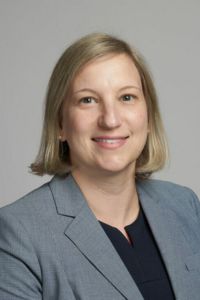A Deeper Well: Women in Medicine and the Power of Personal Connection
Published September 17, 2024
Inside OME

By Stephanie White, DO, FAAFP, associate dean, Clinical Education COMP & COMP-Northwest and associate professor Family Medicine
Most mornings start at 5:30 AM. The alarm on my phone plays a soothing Alicia Keys track and I roll out of bed, bleary eyed. I skillfully extract myself from dog paws and occasionally, the erratic limbs of my five-year-old daughter. I shower, dress, read the news and down two cups of espresso. My husband, also an early riser, greets me in the kitchen. He’s prepping lunches, tracking down the homework folder and wrangling the now hungry dogs. On lucky mornings, both kids are awake when I leave the house before 7:00 AM. I get hugs, smiles and well wishes for the day. On other days I tiptoe into their bedroom, kissing their cheeks and trying to contain my guilt and sorrow that they will wake up without me, again. My commute to work is 40 miles. I spend the time listening to podcasts, audiobooks, CME or enjoying the steady rhythm of Los Angeles freeways. My mind will process the morning events, the groceries I need to pick up and back-to-school-night. I then prepare for the tough conversation I have scheduled at 10:00 AM, the patient with the new cancer diagnosis, the report that’s due. Somewhere in West Covina I’ll shift from Mom and Wife to Doctor and Associate Dean.
Who you are is how you heal. We each bring our unique lens of the world to our patient care and our leadership. When I walk in to the patient examination room or the C-Suite, I arrive with my rigorous medical education, continuous professional development and my capacity to make buttered noodles with the flaky salt that Parker loves best. I contain multitudes.
We often talk about representation in medicine and sometimes it feels like a buzz phrase, meant to demonstrate our compliance with accreditation standards. Representation is far more meaningful and personal than that. When I discuss sexual harassment policy, I recall the countless times I was on the receiving end of harassment. When I lecture on LGBTQIA+ access to care, I draw on my experience being raised in a queer household. When I hold the hand of a woman struggling with infertility, I share my own heart wrenching tale and how I coped with the repeated losses.
I teach a session to first-year osteopathic medical students called “The Inner Well.” I explain that as an osteopathic physician I blend my knowledge of evidence-based medicine with my own capacity for human connection. Within me is a “well” of curiosity, empathy, courage and generosity. I draw on this well when treating patients to ensure they receive the best care, the most osteopathic care. I fill my well with loving relationships, exercise, time in nature and music. My well is depleted by conflict, busy work, external challenges and adversity. The well is carved by the sum of my losses and traumas, both big and small. With each hardship, the depth of my well grows. More depth results in deeper and more meaningful connection. Now in my mid-forties, my inner well is cavernous but thankfully I am skilled at keeping it full. This visualization encourages students to begin to build their own professional identity. They start to recognize how their individual narrative will shape the way they show up as osteopathic physicians for their patients and colleagues.
So many patients feel invisible. They attempt to navigate a complex healthcare system designed to preferentially treat the most privileged identities. Individual stories get lost. Lives are lost. Doctors may be trained in the choreography of empathetic practice, but it’s not enough. Patients need more than a checklist of eye contact, seat placement and open-ended questions. Patients need access to their doctor’s inner well. Patients need to see someone familiar across from them. Someone who is also making buttered noodles with the good salt.
As we celebrate women in medicine I feel a blend of gratitude and responsibility. My mentors endured painful conditions to build a path for me to follow. I have the joy of a loving family and meaningful work because of their sacrifices. As I drive home tonight, transitioning back from Doctor and Associate Dean to Mom and Wife I will consider my role. What doors do I need to open now? Who is missing from the patient examination rooms and C-Suites? How do I make sure all patients are seen and heard? I commit to continuing the change, one unique medical student at a time. I celebrate our progress, and I look ahead to a more inclusive, more generous osteopathic profession.
